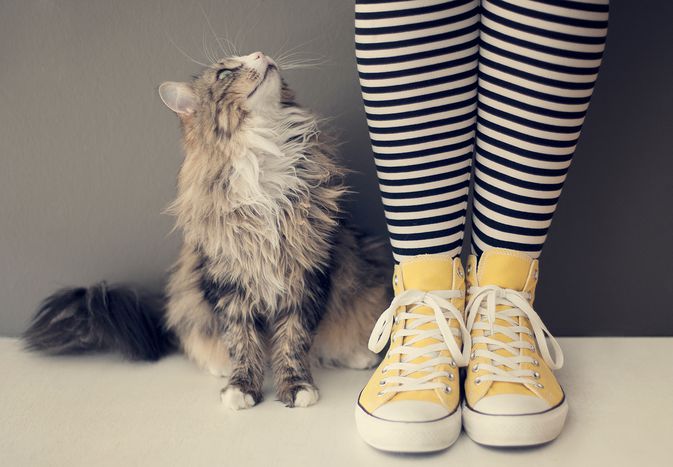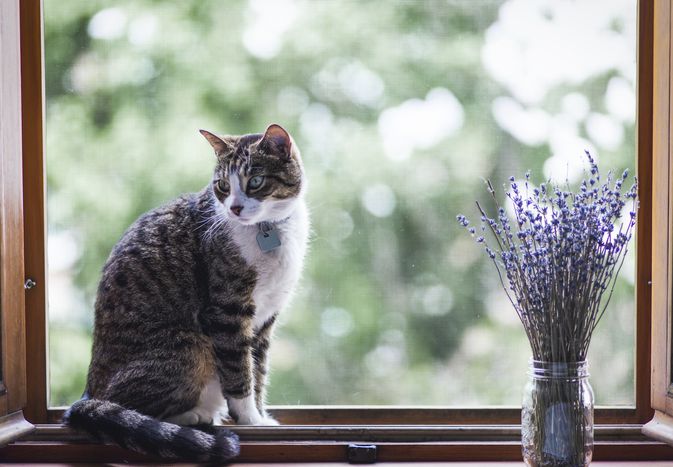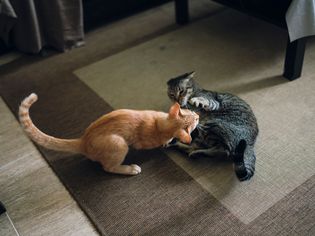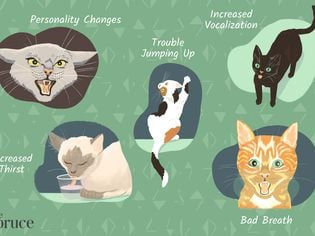Can you use dog flea control on a cat? The short answer is no. It is not recommended to use any product labeled for dogs on your cat. However, sometimes even products labeled for cats are often not safe either. Educate yourself on what to look for and what to avoid in cat flea prevention. Quick note: Your veterinarian is always a great resource for safe and effective flea prevention recommendations. It's still a good idea to know what your options are and what may work best for you and your cat's lifestyle before reaching out to them for suggestions.
There are a variety of different types of flea medications and routes of administration. Many are unsafe, if not toxic, to cats, and it can be confusing figuring out if you can give the same thing to both your dog and your cat. Knowing what safe flea medication options you have for your cat can help not only keep fleas away but will also help prevent serious harm.
Types of Flea Medications
Flea medications can be administered to dogs and cats a variety of ways including:
- Topical - Typically applied to the skin on the back of the neck in a location that is not able to be licked off by your pet, topical flea medications are available both over the counter and from your veterinarian. Depending on the topical product used, these products can provide up to a month or more of protection from fleas.
- Oral - Taken by mouth either as a treat or a pill, oral flea medications are available most commonly from your veterinarian but some types can be found over the counter. If you want to avoid having a wet spot that you can't touch on your pet for a few hours or having to question whether or not a topical medication was fully absorbed then oral flea medications are a good option. Again, like topical prevention, some products provide up to a month of flea prevention.
- Sprays - Usually only used when there is an active flea infestation, sprays usually contain all-natural or permethrins that are designed to be sprayed directly onto pets as well as surfaces. It is important to note that permethrins can toxic to cats depending on the dose and you should use caution when using any on your cat. Another important point, is that most sprays do not have any residual effect. This means that soon after application your cat will be susceptible to fleas again. Sprays are most often purchased from pet stores but some veterinarians offer them as well. If you are considering the use of a spray on your cat, a call to your veterinarian before using one can help avoid serious complications.
- Shampoos - Like sprays, shampoos are only used if your pet has fleas since there are no lasting preventative benefits. Shampoos for giving a pet a flea bath may contain all-natural ingredients or permethrins to kill live fleas. Because cats are typically not fond of baths and the medications or ingredients in some shampoos can potentially be dangerous, and they offer no lasting preventative benefits, this is probably the least desirable way to clear fleas off your cat. Also, like sprays, a call to your vet before using any flea shampoo on your cat is a good idea.
- Powders - Beneficial for carpeting and other fabric surfaces, powders are used if there are live fleas in your pet's environment.
- Flea Bombs - Another option for treating an environment that has a flea infestation, flea bombs create a fog or aerosol that is able to infiltrate small spaces that fleas like to live. All people and pets need to leave the premises if a flea bomb is used as it can be toxic if inhaled. When using flea bombs, you will need to pay close attention to instructions and how long you will need to be out of the home to avoid any toxicity to you or your pets.
- Collars - Historically, flea collars only helped keep fleas off of the neck of a pet but new technology has made some collars much more effective at preventing fleas than the older versions. One collar with safe and effective ingredients has been proven to prevent fleas in cats for eight months!
Medications Used to To Treat Fleas
In addition to all the different ways flea medications can be applied, there are a variety of different types of drugs, as well as all-natural ingredients, that are used in pets. Some are safe for both dogs and cats at appropriate dosages while others are toxic to cats. New drugs are regularly introduced to the pet market but popular options include:
- Selamectin
- Permethrin
- Fipronil
- Afoxolaner
- Nitenpyram
- Spinosad
- Fluralaner
- Sarolaner
- Imidacloprid
- All-natural ingredients
Giving Your Cat Your Dog's Flea Medication
Cats are not simply little dogs so that means you should not give a cat what a dog can take for fleas. Cats metabolize drugs differently than dogs and giving your cat your dog's flea medication can be fatal. If your flea medication is not specifically designed for a cat then it should not be given to your cat. Even if the type of medication can be safely used in a cat, the dosage designed for a dog is most likely very different. Seizures and death can be caused if a cat receives flea medications that are not safe for them. When in doubt, always ask your veterinarian before giving your cat a new flea medication.
Safe Flea Medications For Cats
If your veterinarian sold you a flea medication specifically designed for cats then it is most likely safe, but if you are purchasing a flea medication from a pet store it may not be safe for a cat, even if the label says it is. For example, permethrin-containing products should always be avoided in cats, despite the fact that many cat products that are often found in pet stores contain this drug. Side effects are always possible with any drug but the following medications are typically regarded as safe for cats when appropriate doses are given:
- Selamectin
- Fipronil
- Nitenpyram
- Spinosad
- Fluralaner
- Sarolaner
- Imidacloprid
Some all-natural ingredients and home remedies may be safe for cats but since they are not very effective in preventing or treating fleas and the ingredients may vary from product to product, they should be discussed with your veterinarian prior to use.
Flea prevention in cats can be confusing, and there are a lot of products out there. If you are overwhelmed you are not alone! When in doubt, reach out to your veterinary team for safe and effective options of flea prevention for your cat.










Comments on " Can You Use Dog Flea Control on a Cat?" :